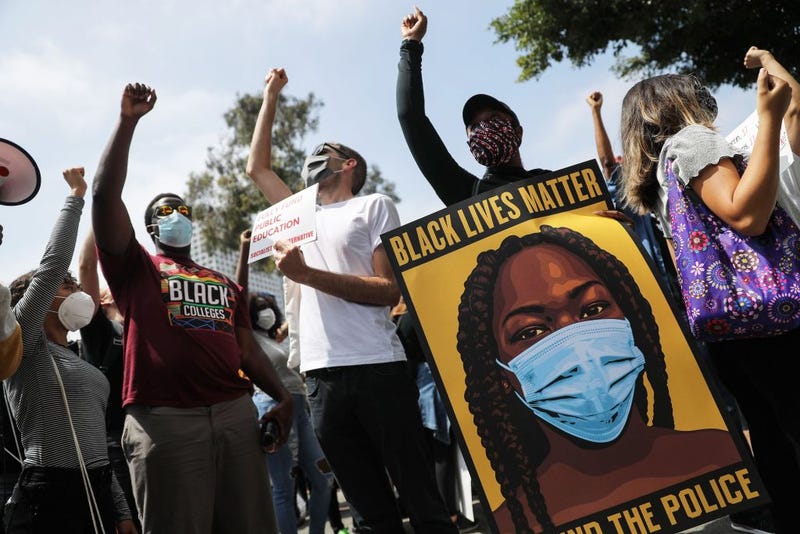
Civil rights activist and organizer DeRay Mckesson joined KNX In-Depth to talk about what has changed since the murder of George Floyd and how to rethink criminal justice.
“In some ways some of the biggest wins have been narrative shifts. The country is talking about [police violence] in a way that it hasn’t. In 2014, we were convincing people that there was a problem. In 2021, people are like, ‘There’s a problem’,” says Mckesson.
Despite the increased awareness of police killings, Mckesson notes the police have already killed 400 people in 2021. According to The Washington Post's Fatal Force database, the police have shot and killed 967 people in the past year.
Mckesson is a longtime civil rights activist and advocate for police reform. He rose to prominence as an organizer with the Black Lives Matter protests that followed the killing of Michael Brown by police officer Darren Wilson in Ferguson, Missouri. Brown’s 2014 death led to months of protests by activists and supporters.
One year ago today, George Floyd’s murder by former Minneapolis Police Department officer Derek Chauvin reignited the movement. Protests erupted across the country and renewed conversations about police brutality. Millions marched. Activists demanded the defunding of police departments.
Last month, a Minnesotta jury ultlimately found Chauvin guilty of murder and manslaughter charges. However, police officers are rarely prosecuted for an on-duty shooting or killing, let alone found guilty, according to Bowling Green State University criminal justice professor Philip Matthew Stinson.
"It's rare because the juries are very reluctant to second guess and judge the actions of on-duty police officers in violent street encounters," Stinson told CNN.
Mckesson promotes reallocating funds from police departments toward social services. Activists say increased budgets for education, mental health services and housing would reduce people’s daily interactions with armed police officers.
“How many things do you need a person with a gun to respond to? Do you need a person with a gun to say that your taillight is broken? No,” Mckesson says, adding, “We have built this system where a person with a gun is the first responder to everything, and that just doesn’t make sense.”
Growing public support for Black Lives Matter is apparent in politicians’ embrace of the movement’s slogan. LA Councilman Mitch O'Farrell supports a permanent “All Black Lives Matter” memorial in Hollywood.
Push toward greater police department accountability
USC Safe Communities Institute announced its own national registry of police officers who were terminated or resigned due to misconduct. The LEWIS, or Law Enforcement Work Inquiry System, Registry is named for the late Rep. John Lewis. The first-of-its-kind registry is currently in beta-testing. Once it is up and running, the creators of the registry hope it will contribute to evidence-based policy around police reform.
Of the police, Mckesson says, “There is no other apparatus in society that we give the right to kill people.”
Mckesson also hosts the podcast “Pod Save The People” and founded Campaign Zero, a platform that promotes policy suggestions to end police violence.
